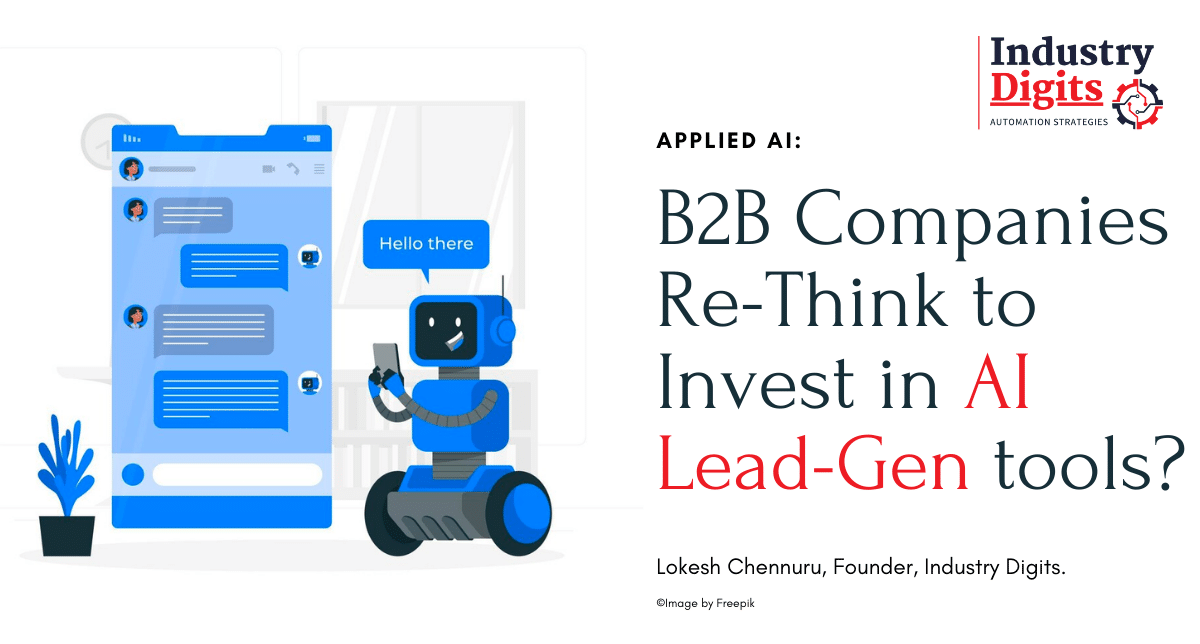How Growth Systems For B2B improves collaboration across teams
Wiki Article
AI Automation for B2B: Strategies to Boost Your Company Performance
AI automation in the B2B industry offers an essential opportunity for companies to enhance their performance. By simplifying processes and boosting decision-making, businesses can attain considerable efficiencies. Nevertheless, the effective combination of AI requires cautious factor to consider of different factors. Understanding which areas to automate and choosing appropriate devices are just the beginning. The possibility for change elevates vital inquiries regarding execution and ongoing assessment. What approaches will ensure enduring success in this advancing landscape?Comprehending AI Automation in B2B Context
As organizations increasingly seek efficiency and technology, understanding AI automation in the B2B context comes to be crucial. AI automation leverages sophisticated modern technologies to enhance procedures, boost decision-making, and improve overall efficiency. By incorporating AI devices, companies can enhance procedures such as supply chain monitoring, consumer partnership administration, and information evaluation. These modern technologies can analyze large quantities of data swiftly, supplying workable understandings that drive calculated efforts. In addition, AI-driven automation reduces human error and frees up employees to concentrate on even more complicated tasks. By fostering cooperation in between human knowledge and device abilities, companies can attain a competitive edge. Eventually, comprehending AI automation is essential for B2B organizations aiming to prosper in a significantly digital marketplace.Determining Locations for Automation
In the quest for effective AI automation in B2B, it is important to identify details areas where automation can produce substantial benefits. This consists of reviewing job monotone, exploring possibilities for data handling, and identifying workflow traffic jams. By concentrating on these aspects, companies can enhance operations and improve performance.Job Monotone Evaluation
Task monotone assessment plays a necessary role in identifying locations ripe for automation within B2B operations. This process entails analyzing everyday tasks to figure out which are lengthy and repetitive, consequently hindering performance. By inspecting operations, businesses can pinpoint certain functions that require extreme hand-operated input, such as data entrance, invoice processing, or consumer follow-ups. Identifying these repetitive jobs enables organizations to assign resources more successfully, enhancing general efficiency (AI Automation For B2B). In addition, automation can lessen human error, enhance procedures, and liberate workers to concentrate on higher-value activities. Performing a detailed task repetitiveness analysis encourages B2B organizations to take on targeted automation approaches, eventually driving boosted efficiency and competitive advantage in the marketplaceData Handling Opportunities
Countless data processing opportunities exist within B2B companies, offering considerable potential for automation. These chances often develop in areas such as data entrance, billing processing, and client connection monitoring. By automating information collection and recognition processes, companies can minimize human error and enhance performance. Furthermore, automating record generation allows groups to accessibility real-time insights, cultivating timely decision-making. Stock administration systems can additionally profit from automation, streamlining stock tracking and order processing. In addition, leveraging AI in information analytics enables companies to discover trends and patterns that might or else go unnoticed. Eventually, embracing automation in these areas not only enhances operations however also releases up beneficial resources, allowing staff members to focus on strategic efforts that drive growth.Process Traffic Jam Identification
Recognizing process traffic jams is an essential action in realizing the complete advantages of automation within B2B companies. These bottlenecks often manifest as delays, source restraints, or inefficient processes that hinder performance. To successfully identify these areas, services can carry out extensive analyses of their operations, using metrics such as cycle time and throughput. Engaging employees in conversations concerning discomfort points can also supply beneficial understandings. Organizations can prioritize them based on effect and feasibility for automation when traffic jams are recognized. By tactically addressing these inadequacies, B2B firms can streamline procedures, boost collaboration, and inevitably improve overall performance. This proactive technique to process evaluation lays the foundation for effective automation campaigns that drive business growth.Choosing the Right AI Equipment and Technologies
As organizations progressively transform to AI to boost their procedures, picking the right tools and technologies becomes vital for attaining wanted end results. Organizations should review their certain demands and objectives, thinking about elements such as compatibility, scalability, and user-friendliness. A thorough market analysis can help recognize leading AI remedies customized for their sector. In addition, organizations should evaluate the technological infrastructure needed to support these devices, making sure smooth combination with existing systems. Data safety and security and compliance with regulations are additionally important considerations that influence device choice. By concentrating on these requirements, companies can make enlightened decisions that drive efficiency and productivity, inevitably causing improved business efficiency. The best AI devices equip organizations to introduce and maintain a competitive side out there.Developing a Critical Application Plan
A successful strategic application plan for AI automation in B2B calls for clearly defined key purposes. Minarik AI. Furthermore, companies should evaluate their present abilities to determine gaps and opportunities for enhancement. Continuous monitoring and change of the approach will certainly guarantee placement with advancing business demands and innovation developmentsDefine Key Purposes
To assure successful AI automation in B2B environments, defining essential goals is important for creating a calculated implementation strategy. Organizations must determine specific, measurable goals that line up with their general organization method. This clarity supplies a roadmap for the automation procedure, guaranteeing that initiatives are concentrated on areas that will certainly yield the greatest influence. Trick objectives might consist of boosting operational effectiveness, boosting customer contentment, or enhancing profits. Establishing these purposes allows groups to focus on sources effectively and track progress gradually. In addition, clear goals facilitate better communication among stakeholders, fostering collaboration and positioning throughout the organization. Inevitably, distinct objectives offer as the structure for a durable AI automation approach that drives business efficiency.
Examine Existing Capacities

Screen and Readjust
Carrying out AI automation calls for a vibrant approach that stresses continuous surveillance and modification - Minarik AI. Businesses need to create a strategic implementation strategy that includes normal analyses of AI efficiency against predefined metrics. This includes tracking key performance indicators (KPIs) to evaluate the effectiveness of automation solutions. By analyzing data, organizations can determine locations for enhancement and tweak their AI systems appropriately. Involving with stakeholders throughout the procedure assures that the automation lines up with company purposes and customer demands. Furthermore, promoting a culture of versatility allows firms to respond swiftly to transforming market problems and technological developments. Ultimately, recurring surveillance and change not only enhance functional effectiveness yet likewise drive sustained service performance in the affordable B2B landscapeEnsuring Data Quality and Combination
As organizations significantly count on AI automation in B2B processes, making certain information quality and assimilation ends up being vital for success. Premium data is important for accurate analytics, notified decision-making, and effective client interaction. Information need to be cleaned, standardized, and validated to eliminate mistakes and incongruities that might cause misdirected insights. Additionally, seamless assimilation throughout numerous platforms and systems is necessary; disparate information silos hinder automation initiatives and decrease functional performance. Organizations ought to take on robust data governance structures and make use of sophisticated devices to help with information assimilation while maintaining high quality criteria. By prioritizing these components, companies can boost their AI automation efforts, inevitably leading to improved efficiency and a competitive benefit in the B2B landscape.Determining Success and ROI of AI Initiatives
How can companies properly measure the success and roi (ROI) of their AI initiatives? To assess effectiveness, services should establish clear, quantifiable goals lined up with critical objectives. Key performance indicators (KPIs) such as cost savings, income growth, and efficiency renovations can give valuable understandings. Organizations typically carry out standard evaluations before executing AI, allowing them to contrast pre- and post-implementation metrics. Furthermore, analyzing customer fulfillment and interaction can reveal the impact of AI on user experience. Regularly assessing these metrics assists in refining AI approaches and making sure positioning with service goals. By employing an organized technique to measurement and assessment, organizations can accurately analyze the performance of their AI initiatives and make informed choices about future investments.Conquering Obstacles in AI Fostering

Often Asked Concerns
Just How Can AI Automation Improve Client Partnership Management in B2B?
AI automation can enhance consumer relationship administration in B2B by enhancing interaction, providing tailored communications, analyzing customer data for understandings, automating follow-ups, and enhancing action times, inevitably cultivating stronger relationships and driving sales development.What Industries Advantage Most From AI Automation in B2B?
Manufacturing, financing, health care, and logistics industries benefit most from AI automation in B2B. These industries leverage automation to streamline processes, improve data analysis, boost customer interactions, and ultimately raise functional effectiveness and productivity.Exactly How Does AI Automation Effect Employee Responsibility in B2B Business?
AI automation transforms worker functions in B2B companies by streamlining jobs, decreasing repeated work, and enabling team to concentrate on critical efforts. This shift boosts productivity and fosters a culture of development and adaptability.What Are the Prices Related To Carrying Out AI Automation?
The costs connected with applying AI automation consist of preliminary software purchase, facilities upgrades, training expenses, recurring maintenance, and possible assimilation difficulties. Minarik AI. Companies have to also consider long-term functional changes and employee adjustment expenses in their financial planningJust How Can Businesses Ensure Ethical AI Use in Their Workflow?
Companies can guarantee ethical AI use by establishing clear standards, advertising transparency, performing routine audits, involving varied stakeholders, and focusing on information privacy. Continuous training and recognition programs further enhance understanding and adherence to moral methods.As services significantly look for effectiveness and innovation, recognizing AI automation in the B2B context ends up being vital. In the quest for reliable AI automation in B2B, it is necessary to identify details locations where automation can yield considerable advantages. An effective calculated implementation strategy for AI automation in B2B calls for clearly specified crucial objectives. To assure effective AI automation in B2B environments, specifying essential objectives is essential for establishing a tactical execution strategy. As organizations significantly rely on AI automation in B2B procedures, guaranteeing data high quality and assimilation ends click for more info up being vital for success.
Report this wiki page